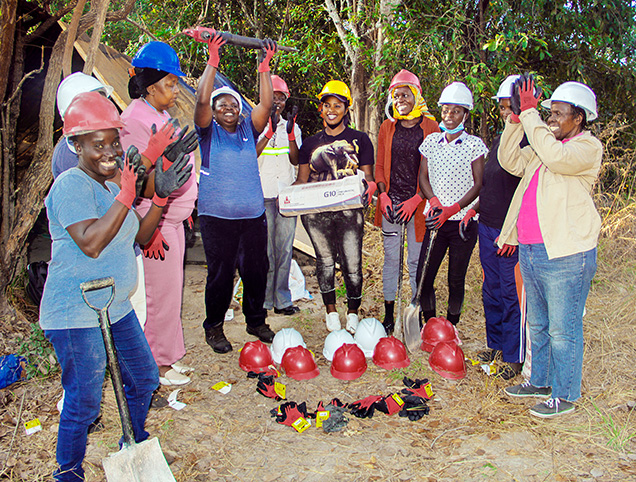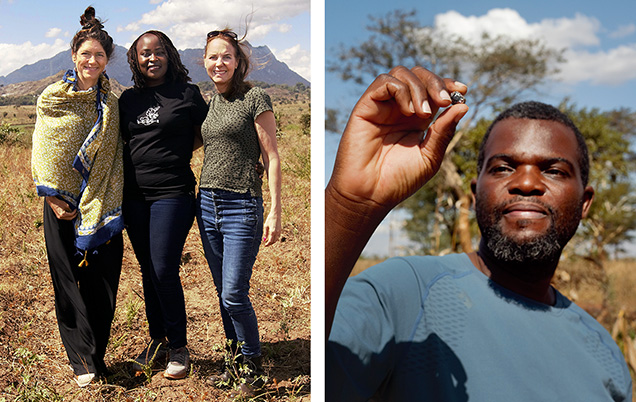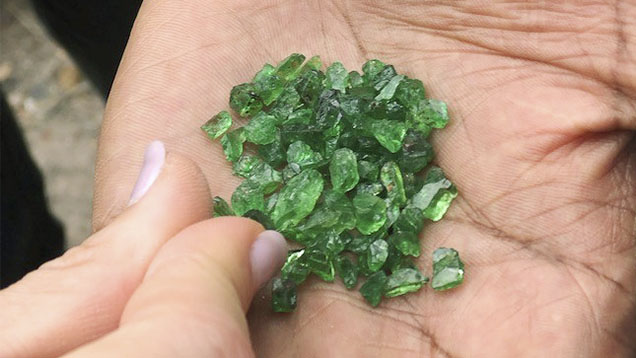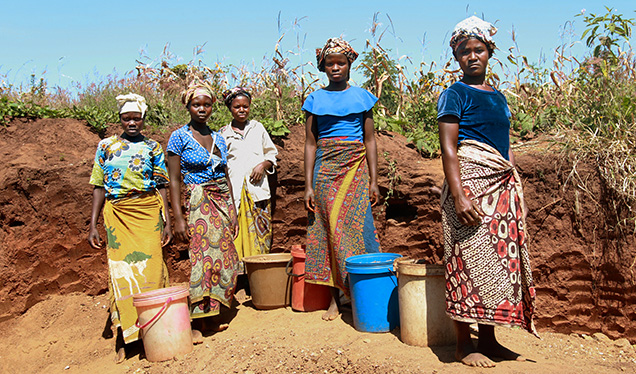Ethical Supply Chain Practices in Africa with Virtu Gem
This year marked Tucson’s fourth Ethical Gem Fair, a market cooperative of ten responsibly sourced gemstone suppliers (see Spring 2020 GNI, pp. 177–179). The fair was held January 28–31 at the Scottish Rite Cathedral. Virtu Gem sells gemstones directly from artisanal mining communities in Kenya, Malawi, and Zambia (figure 1) and debuted at the fair in 2022. We spoke with cofounder Susan Wheeler and Percy Maleta, Virtu Gem’s country exporter and ambassador in Malawi, about its beginnings, programs, and impacts.
Wheeler said more new customers come to the Ethical Gem Fair each year. “All the large companies come by, too,” she said. “There were a lot this year that everybody was surprised by. I think that the awareness of what artisanal mining is and what it can be is spreading.”

Virtu Gem gives artisanal miners, cutters, and traders formal access to international markets and began as a project of Wheeler’s nonprofit Responsible Jewelry Transformative (RJT). Virtu Gem’s programs also offer training in cutting and basic gemology and help miners improve safety, labor, and environmental conditions at the mines, all with a focus on women. Their gemstone prices include a 10% premium that goes toward fulfilling the mining communities’ various needs. During the height of the COVID-19 pandemic, the premium was used for food drives in all three countries and personal protective equipment for Kenyan women miners; currently it goes to the purchase of safety equipment (figure 2).

Wheeler and cofounders Jessica Hudson and Monica Gichuhi (figure 3) began selling gemstones from Zambia online in 2020, after the pandemic forced the cancellation of a conference they had planned there that would have provided a market for traders. “There was a call to action from the Organisation for Economic and Co-operative Development (OECD) to support all the artisanal miners because no one was coming to the country to buy their stones,” Wheeler said. The OECD’s Call to Action for Responsible Mineral Supply Chains cited COVID-19’s disproportionate impact on artisanal and small-scale miners, who make up more than 80% of the global mining workforce and already face inequities in the supply chain. Wheeler and Hudson are both jewelry designers; Gichuhi is a founding member of the Association for Women in Extractives in Kenya (AWEIK). Her connections with mining associations in Zambia were a starting point.
Beginning in 2021, Virtu Gem received two grants through RJT from the World Bank’s Extractives Global Programmatic Support fund. The fund’s purpose is to promote sustainable and inclusive mining in developing countries and thereby reduce poverty. The grants allowed them to expand into Kenya and Malawi, hold virtual cutting workshops, and implement CRAFT Code in eight mines. (“CRAFT” stands for Code of Risk mitigation for Artisanal and small-scale miners engaging in Formal Trade.) Virtu Gem also hired experienced international consultants.
“There’s been a huge amount of progress over the past two years,” Wheeler said. The funding helped Virtu Gem develop a strong foundation, she said, and grow enough to be able to pass any chain of custody standard for large-capacity buyers.
While Virtu Gem has had success in all three countries, Wheeler said Kenya has seen the most because some in the trade already had Ultra Tec cutting machines and were selling to the international market. “After the first few purchases we did, word spread,” she said. “People were showing up with 50 gems at a time to process.” Miners can also bring gems to the country coordinators for cutting.

Virtu Gem’s gemstones are cut in each country and tracked with Provenance Proof Blockchain. They include amethyst, aquamarine, citrine, moonstone, rhodolite and other garnets, in all three countries; emeralds in Zambia; tsavorite in Kenya (figure 4); and color-change garnet in Malawi. The three countries also produce tourmaline in various colors, including pinkish orange (“sunset”) in Malawi and Zambia and golden in Kenya and Malawi. Production of morganite from newly discovered deposits in northern Malawi recently began.
Virtu Gem has helped miners implement CRAFT Code at four mines in Zambia, two in Malawi, and two in Kenya. CRAFT Code is designed to improve safety, labor, and pay conditions through education at the mines. Its components include mine site certification, safety standards and equipment, and environmental planning, including carbon data tracking and reduction.
CRAFT Code has an emphasis on protecting women, and Wheeler said they focused on women for the associated training. Focusing on woman-owned mines was more difficult, however. “It’s a big challenge for women to own any land at all, especially in Zambia, Kenya, and Malawi,” Maleta said. In Zambia, two of the mines—one emerald and one amethyst—were woman-owned, and in Kenya they worked with a young woman whose family owned a mine.

One of Virtu Gem’s benefits is helping artisanal miners formalize their mining process. In Malawi, country coordinator Chiko Manda wanted to focus on rhodolite. Maleta said women account for roughly 80% of rhodolite production there (figure 5). Rhodolite is alluvial and best mined during the rainy season in Malawi, when the women are busy tending their gardens. Virtu Gem worked with a young couple, Ben and Tamara, who did not have a mining certificate.
“The chief of the Chewa people didn’t want the women mining,” Wheeler recalled. “Ben had to go and prove himself to the chief, that he wasn’t going to take advantage, and that the women could still do their agriculture.” Ben joined Virtu Gem’s calls with miners in Kenya and Zambia who shared advice. “He ended up getting permission to mine on the land and the blessing of the chief,” she said. “He sent me on WhatsApp a picture that he had gotten his certificate. He was so happy.” Maleta said that Ben recently received another land permit and is applying for a second mining certificate. “That was a way we could still work with the women,” Wheeler said.
Wheeler mentioned the danger of holding a large amount of gemstones in an informal market, which Ben and Tamara encountered with a quantity of rhodolite. “You have the paradox of the women’s safety,” she said. “Everybody hears about it, and you get all these other dealers and traders coming in. How are they going to get a fair price? Yet they can’t hold on to it.” She said Ben called his friends and pleaded with them to purchase some of the rhodolite. She would like to see a formal system to address this type of scenario.
Maleta said the past four or five years have seen an influx of Kenyans and Zambians to Malawi to buy gems, some of whom export them back home and misrepresent the source country. By exporting directly from Malawi, Virtu Gem has improved supply chain transparency.
Maleta said Virtu Gem pays more than the informal market, but convincing people to participate can be a challenge. “To have someone leave a stone with you and wait—for maybe two months, three months—it hasn’t been easy,” he said. “But we have people who understand the process, who know that the stone they are leaving with Virtu will be sold, but also understand that if it’s not sold, it will be returned. That is trust.”
“I was surprised by the lack of trust at the beginning,” Wheeler said. “We have to work hard to earn the trust from everybody in the gemstone community. We couldn’t have done this without our partner, Monica Gichuhi, working within the communities, and our country coordinators.” She mentioned Caroline Muchira in Kenya, who is also a cutter and a GIA Graduate Gemologist; Manda in Malawi; and Pauline Mundia in Zambia, a respected woman leader whom everyone calls “Mama Pauline.”
“Living up to expectations is hard every single day,” Wheeler said. “Tucson is hard because we don’t own anything on display. Those are people sending us their stones that they’ve invested in. Before, they would have just sold them and not invested in separating parcels and cutting. That’s a lot of pressure. We’ve earned some of that trust, and we really have worked hard to earn that.”
“It’s a dream come true for many to have their stones sold at this level,” Maleta said. “For us, for the country, for the people who are trading, the future is bright.”



